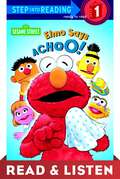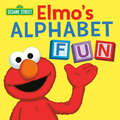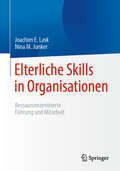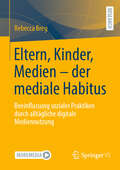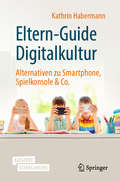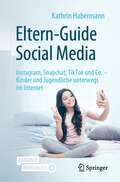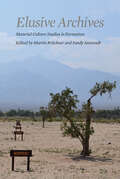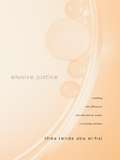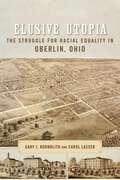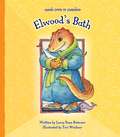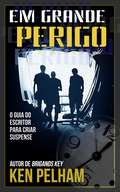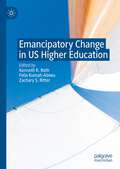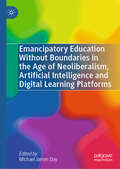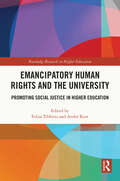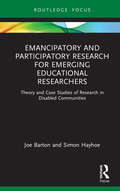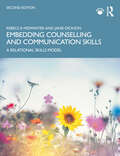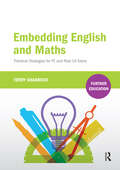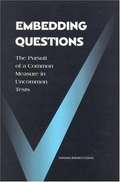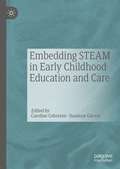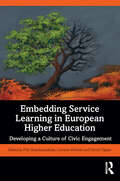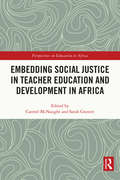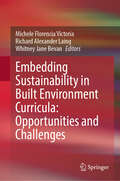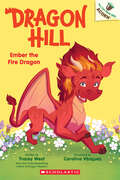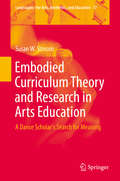- Table View
- List View
Elmo Says Achoo! (Step into Reading)
by Sarah AlbeeElmo's bringing a present to Oscar in this silly story enhanced with audio narration by Bob McGrath from Sesame Street. But the mysterious wrapped gift has a curious effect—it's making Elmo sneeze! And every time Elmo sneezes, something funny happens. The youngest readers will love following along as Elmo's sneezes cause laundry to fall off a line and much more in this Early Step into Reading™ storyThis ebook includes Read & Listen audio narration.
Elmo's Alphabet Fun (Pictureback(R))
by Jennifer LibertsIt's Alphabet Day at school, and Elmo is ready to learn his letters! This paperback picture book includes Sesame Street stickers for each letter of the alphabet!Elmo, Abby, Julia, and other Sesame Street friends are extra excited for school because today is Alphabet Day. Their preschool teacher has them singing the ABC song, decorating letters, and playing a fun alphabet game! Young children will love learning their letters with Elmo.Sesame Workshop, the nonprofit educational organization behind Sesame Street, aims to help kids grow smarter, stronger, and kinder through its many unique domestic and international initiatives. These projects cover a wide array of topics for families around the world. Sesame Street is the most trusted name in early learning.
Elterliche Skills in Organisationen: Ressourcenzentrierte Führung und Mitarbeit
by Joachim E. Lask Nina M. JunkerElterliche Skills in Organisationen - Ressourcenzentrierte Führung und Mitarbeit Basierend auf aktuellen wissenschaftlichen Erkenntnissen verdeutlicht „Elterliche Skills in Organisationen“, wie sich Organisationen und jeder Einzelne die aus der Elternrolle erworbenen Kompetenzen ressourcenorientiert nutzbar machen können. Denn es ist nachgewiesen, dass zahlreiche Ähnlichkeiten zwischen der Elternrolle und der Rolle als Mitarbeitende und Führungskräfte bestehen. Dadurch kann beachtlicher gegenseitiger Kompetenzerwerb ermöglicht werden. Wie dies möglich ist, welche Skills für Führungskräfte besonders relevant sind und wie der positive Transfer der Kompetenzen aus der Elternrolle unterstützt und für die Tätigkeit im Unternehmen noch besser eingesetzt werden kann, erfahren Sie in diesem Buch. Zielgruppen: Führungskräfte, HRM-Fachleute, Coaches, TrainerInnen, PsychologInnen, WirtschaftswissenschaftlerInnen, sowie Eltern. Zu den Autoren: Dipl.-Psych. Joachim E. Lask, Wirtschafts- und Familien-Psychologe und Leiter des WorkFamily-Instituts, berät Organisationen und forscht zum Work-Family Enrichment. Dr. Nina M. Junker, Associate Professor an der University of Oslo, ist Arbeits- und Organisationspsychologin. Sie forscht und publiziert unter Berücksichtigung sozialpsychologischer Konzepte seit vielen Jahren zur Schnittstelle von Beruf und Privatleben.
Eltern, Kinder, Medien - der mediale Habitus: Beeinflussung sozialer Praktiken durch alltägliche digitale Mediennutzung
by Rebecca BregIn diesem Buch wird das Mediennutzungsverhalten von Heranwachsenden (11–15 Jahre) im Zusammenhang mit sozialer Herkunft und habituellen Mustern empirisch untersucht. Mithilfe von Fragebögen und Interviews wird die digitale Mediennutzung von Schüler*innen an Mittelschulen und Gymnasien verglichen. Die Ergebnisse zeigen, dass mediale Praktiken durch familiäre Strukturen, das soziale Umfeld und kulturelles Kapital beeinflusst werden. Die Untersuchung hebt Unterschiede im digitalen Nutzungsverhalten hervor, die sich in Zugangsmöglichkeiten, elterlicher Begleitung und der Mediennutzung im Alltag zeigen. Während Schüler*innen aus privilegierten Verhältnissen digitale Medien gezielt für Schule und Freizeit nutzen, steht bei sozioökonomisch schwächeren Heranwachsenden oft die Unterhaltung im Vordergrund. Das Konzept des Habitus zeigt, wie soziale Praktiken die Mediennutzung prägen. Digitale Medien sind eng mit sozioökonomischen Strukturen verknüpft. Das Buch liefert wertvolle Erkenntnisse für Eltern, Pädagog*innen und politische Entscheidungsträger*innen, um digitale Kompetenz und Chancengleichheit nachhaltig zu fördern.
Eltern-Guide Digitalkultur: Alternativen zu Smartphone, Spielkonsole & Co.
by Kathrin HabermannDieser Ratgeber hilft Eltern, mit der allgegenwärtigen Präsenz von Smartphone, Tablet und Co. gelassen und kreativ umzugehen. Erfahren Sie, weshalb Smartphones gerade Ihre Kinder magisch anziehen, wie wichtig Langeweile für die Entwicklung Ihres Kindes ist und welche Auswirkungen der Medienkonsum auf die Gehirnentwicklung hat. Dieses Buch zeigt Ihnen zahlreiche spannende und gleichzeitig entwicklungsfördernde Alternativen zum Medienkonsum, die Sie täglich anbieten können. Praxistipps für herausfordernde Situationen wie der Restaurantbesuch, lange Autofahrten oder die fünfstündige Bahnfahrt: Mit dieser Lektüre sind Sie optimal gerüstet.Plus:• Wissenschaftliche Hintergründe und aktuelle Studien übersichtlich und verständlich aufbereitet• Fragebögen und Checklisten zur Ermittlung des Medienkonsums• Material- und Spiellisten, Mediennutzungsvertrag u.v.m. zum Download und als Kopiervorlage
Eltern-Guide Social Media: Instagram, Snapchat, TikTok und Co. – Kinder und Jugendliche unterwegs im Internet
by Kathrin HabermannDieser Ratgeber verschafft Eltern einen Einblick in die Welt von TikTok, Instagram, Facebook, Twitter und Co. und erklärt, welche Chancen und Gefahren das Internet für ihren Nachwuchs birgt. Welche Plattformen sind auf dem Markt und wie funktionieren sie? Worauf sollte ich achten, wenn mein Kind beginnt, in Onlineshops zu bestellen? Wie sieht die gelungene Anleitung zum Umgang mit modernen Medien im Idealfall aus? Erfahren Sie, was Kinder und Jugendliche selbst über den Medienkonsum denken und wie viel Medienkompetenz heute wirklich notwendig ist, um gesellschaftlich und beruflich nicht abgehängt zu werden.Aus dem Inhalt:• Auswirkungen digitaler Medien auf Gehirnentwicklung, Konzentration und Suchtverhalten• Einsatz digitaler Medien in Schulen• Chancen und Risiken von Social Media und Gaming, Onlinehandel und Datenschutz• Richtlinien zur gesunden Screentime und Anlaufstellen für ElternKlären Sie sich und Ihren Nachwuchs auf und verhelfen Sie ihren Kindern zu verantwortungsvollem Handeln im Internet.
Elusive Archives: Material Culture in Formation (Material Culture Perspectives)
by Oliver Scheiding Wendy Bellion Bernard L. Herman Julian Yates Sarah Wasserman Alexander Lawrence Ames Torsten Cress Julie L. McGee Cindy Ott Laura E. Helton Jennifer Van Horn Kiersten Thamm Alexandra Ward Halina Adams Rosalie Hooper Spencer Wigmore Catherine Morrissey Michelle Everidge Kaila T. Schedeen Lu Ann Cunzo Natalie Elizabeth Wright J. Ritchie Garrison Jesse Kraft Michael J. Emmons Jessica ConradThe essays that comprise Elusive Archives raise a common question: how do we study material culture when the objects of study are transient, evanescent, dispersed or subjective? Such things resist the taxonomic protocols that institutions, such as museums and archives, rely on to channel their acquisitions into meaningful collections. What holds these disparate things together here are the questions authors ask of them. Each essay creates by means of its method a provisional collection of things, an elusive archive. Scattered matter then becomes fixed within each author’s analytical framework rather than within the walls of an archive’s reading room or in cases along a museum corridor. This book follows the ways in which objects may be identified, gathered, arranged, conceptualized and even displayed rather than by “discovering” artifacts in an archive and then asking how they came to be there. The authors approach material culture outside the traditional bounds of learning about the past. Their essays are varied not only in subject matter but also in narrative format and conceptual reach, making the volume accessible and easy to navigate for a quick reference or, if read straight through, build toward a new way to think about material culture.
Elusive Justice: Wrestling with Difference and Educational Equity in Everyday Practice (Teaching/Learning Social Justice)
by Thea Renda Abu El-HajElusive Justice addresses how educators think about and act upon, differences in schools - be they based on race, gender, class, or disability - and how discourse and practice about such differences are intimately bound up with educational justice. Rather than skip over contentious or uncomfortable dialogues about difference, Thea Abu El-Haj tackles them head on. Through rich and detailed ethnographic portraits of two schools with a commitment to social justice, she analyzes the ways discourses about difference provide a key site for both producing and resisting inequalities, and examines the dilemmas that emerge from either focusing on or ignoring them. In interrogating fundamental assumptions about difference and equity, Abu El-Haj deftly blends critique with a search for hope and possibility, to ultimately argue for ways educators might translate ideals about justice into effective practice.
Elusive Utopia: The Struggle for Racial Equality in Oberlin, Ohio (Antislavery, Abolition, and the Atlantic World)
by Edward Bartlett Rugemer Gary Kornblith Richard J. Blackett Carol LasserBefore the Civil War, Oberlin, Ohio, stood in the vanguard of the abolition and black freedom movements. The community, including co-founded Oberlin College, strove to end slavery and establish full equality for all. Yet, in the half-century after the Union victory, Oberlin’s resolute stand for racial justice eroded as race-based discrimination pressed down on its African American citizens. In Elusive Utopia, noted historians Gary J. Kornblith and Carol Lasser tell the story of how, in the nineteenth and early twentieth centuries, Oberlin residents, black and white, understood and acted upon their changing perceptions of race, ultimately resulting in the imposition of a color line.Founded as a utopian experiment in 1833, Oberlin embraced radical racial egalitarianism in its formative years. By the eve of the Civil War, when 20 percent of its local population was black, the community modeled progressive racial relations that, while imperfect, shone as strikingly more advanced than in either the American South or North. Emancipation and the passage of the Civil War amendments seemed to confirm Oberlin's egalitarian values. Yet, contrary to the expectations of its idealistic founders, Oberlin’s residents of color fell increasingly behind their white peers economically in the years after the war. Moreover, leaders of the white-dominated temperance movement conflated class, color, and respectability, resulting in stigmatization of black residents. Over time, many white Oberlinians came to view black poverty as the result of personal failings, practiced residential segregation, endorsed racially differentiated education in public schools, and excluded people of color from local government. By 1920, Oberlin’s racial utopian vision had dissipated, leaving the community to join the racist mainstream of American society.Drawing from newspapers, pamphlets, organizational records, memoirs, census materials and tax lists, Elusive Utopia traces the rise and fall of Oberlin's idealistic vision and commitment to racial equality in a pivotal era in American history.
Elwood's Bath
by Larry Dane BrimnerYoung Elwood prepares for bathtime as he adds his favorite playmates, including eight large elephants, to the water.
Em Grande Perigo - O Guia do Escritor para Criar Suspense
by Ken Pelham João WolfAprenda as dicas, truques e técnicas para criar e manter o suspense na ficção. Por que alguns romances prendem tanto o leitor, que é impossível parar de virar as páginas uma após a outra, enquanto outros fazem o leitor se arrastar por elas? O que esses livros tem de especial? Em uma palavra: suspense. O escritor chama você, prende você e depois o solta. Mas como? Não é por acidente. Aprenda as dicas, truques e técnicas para criar suspense na ficção, e até mesmo na não-ficção. Neste conciso guia, você irá aprender o que faz o suspense acontecer, por que gostamos dele, e como saber utilizá-lo em seus escritos. Gênero: Educação e Referência Gênero Secundário: Mistério, Thriller e Suspense Idioma Original: Inglês Número de Palavras: 11,770 Informações: Eu possuo oito livros disponíveis online para venda no formato de ebooks e também como livros de bolso, e dois mais ainda no forno. Meu primeiro romance, o thriller de suspense Brigands Key, foi publicado comercialmente em 2012 e já teve mais de 7,000 exemplares vendidos ou baixados. Este livro, Em Grande Perigo, foi publicado no verão de 2014. Com frequencia eu dou palestras sobre o tema de como criar e manter o suspense. Trecho do livro: Suspense... Mas que Diabos É Isso? Todo mundo tem uma ideia do que seja o suspense, mas o que é isso exatamente? O que causa o suspense? E, mais importante para os escritores, como podemos usá-lo a nosso favor? Pra começar, o dicionário Merriam-Webster nos dá uma definição. Suspense (substantivo): um sentimento ou estado de nervosismo ou excitação causado pela imaginação do que irá acontecer. É até bem simples. Mas não significa muita coisa, realmente. É correto dizer que o suspense é uma forma de incerteza. Além disso, o suspense está vinculado ao medo. Apesar de não serem a mesma coisa, existe
Emancipatory Change in US Higher Education
by Zachary S. Ritter Kenneth R. Roth Felix Kumah-AbiwuThis edited volume explores and deconstructs the possibilities of higher education beyond its initial purpose. The book contextualizes and argues for a more robust interrogation of persistent patterns of campus inequality driven by rapid demographic change, reduced public spending in higher education, and an increasingly polarized political landscape. It offers contemporary views and critiques ideas and practices such as micro-aggressions, implicit and explicit bias, and their consequences in reifying racial and gender-based inequalities on members of nondominant groups. The book also highlights coping mechanisms and resistance strategies that have enabled members of nondominant groups to contest primarily racial- and gender- based inequity. In doing so, it identifies new ways higher education can do what it professes to do better, in all ways, from providing real benefit to students and communities, while also setting a bar for society to more effectively realize its stated purpose and creed.
Emancipatory Education Without Boundaries in the Age of Neoliberalism, Artificial Intelligence and Digital Learning Platforms
by Michael James DayThis edited book explores how university educators are leading pro-human change in global higher education in a rapidly evolving digital era. The book highlights the transformative power of collaboration, impactful educational development, and inclusive communities within academic settings, demonstrating how education without boundaries can catalyse social, political, and human rights advocacy. Through insightful ethnographic accounts and expert perspectives, chapters examine the challenges and opportunities of artificial intelligence, neoliberal university expansion, and digital learning environments. This collection offers practical strategies and critical reflections for fostering student success, advancing teaching and learning, and shaping curriculums suited to the post-digital future of higher education. The book will interest academics and students exploring higher education, digital education, educational technology, artificial intelligence, pedagogy, and human rights.
Emancipatory Human Rights and the University: Promoting Social Justice in Higher Education (Routledge Research in Higher Education)
by André Keet Felisa TibbittsThis volume explores the application of human rights to higher education through a critical lens. Combining theoretical and applied perspectives, it asks what a human rights framework grounded in liberation and justice can offer to ways of working and teaching practices in higher education. Human rights, in this edited compilation, call for continuous critical engagements around the higher education transformation project. The book recognizes human rights simultaneously as law, values, and emancipatory vision. It showcases global north and global south perspectives and encourages a dialogue between the human rights approach and other approaches to higher education transformation, such as decolonialization, anti-racism, diversity and inclusion, and intersectionality. Individual chapters featuring a range of case studies written from global south and north perspectives critically examine higher education practices linked with human rights, ranging from curricular practices to student activism and community partnerships. The critical space of the university and its role in the transformation of society is therefore viewed in multi-dimensional ways. Underlining the value of applying human rights as a framework in understanding and designing higher education transformation, the book will be of great interest to scholars, researchers, and post-graduate students in the fields of the sociology of education, human rights education, higher education, and social justice education
Emancipatory and Participatory Research for Emerging Educational Researchers: Theory and Case Studies of Research in Disabled Communities (Qualitative and Visual Methodologies in Educational Research)
by Simon Hayhoe Joe BartonEmancipatory and Participatory Research for Emerging Educational Researchers is a concise fundamental guide on two related models of education research—emancipatory and participatory. In addition to providing an introduction to these research models, this book also studies them through the lens of critical practice as well as pure research and provides case studies as examples. It highlights a variety of data collection techniques that are used in education research, from visual methods to interviews, and the strategies researchers apply to ensure the research process involves and benefits the participants. Emancipatory and Participatory Research for Emerging Educational Researchers functions as a useful "how-to" guide for first-time and less experienced researchers. Furthermore, it highlights not only how participatory research is by its nature emancipatory but also the overlaps between the two models’ approach to data collection.
Embedding Counselling and Communication Skills: A Relational Skills Model
by Rebecca Midwinter Janie DicksonEmbedding Counselling and Communication Skills provides a step-by-step approach for those looking to gain a theoretical and practical understanding of using counselling and communication skills within the helper role and applying these skills in the context of professional practice.This revised edition is brought up to date with new content around the subjects of working online, working across difference and diversity, coaching, grief and loss and managing challenging situations. Written in a clear and accessible teaching style, this book progresses through the ‘initial helper’ communication skills that are used in everyday life, to the more complex and in-depth counselling skills required in a helper relationship. It introduces the reader to a Relational Skills model which demonstrates the phases of relationship development. The authors show what happens within each phase and identify how and when to use skills appropriately. Knowledge of reflective practice, aspects of the relationship and how to manage change ensures the text considers the full range of general and specific skills and abilities required. Learning is brought alive through the use of online video clip sessions of a real helper/client relationship giving the reader opportunities and encouragement to reflect and evaluate their learning.This book will be an essential resource for students taking an introductory counselling skills course, other trainees within the mental health sector, coaches and many other qualified professionals who wish to enhance their knowledge of embedding counselling skills into their work and practice.
Embedding English and Maths: Practical Strategies for FE and Post-16 Tutors (Further Education)
by Terry SharrockFE and other post-16 tutors are increasingly being asked to embed and develop English and maths skills in their lessons, and the revised common inspection framework from Ofsted places an increased emphasis on this. You may lack confidence or the required background knowledge to do this, or be struggling to find ideas that will engage and motivate your learners. Specifically written for use within vocational contexts, this text provides you with a theoretical understanding of the issues involved, including barriers to learning and how to overcome these. In addition it offers a range of practical strategies and ideas to get you started and build confidence and competence in your students. Each activity is accompanied by detailed notes that highlight key learning points, the development of vocational skills and extension opportunities.
Embedding Questions: The Pursuit of a Common Measure in Uncommon Tests
by National Research CouncilInformation on The Pursuit of a Common Measure in Uncommon Tests
Embedding STEAM in Early Childhood Education and Care
by Susanne Garvis Caroline CohrssenThis book approaches STEAM (Science, Technology, Engineering, the Arts and Mathematics) in early childhood education from multiple angles. It focuses on the teaching and learning of children from two years of age to the early years of school. Proponents of STEAM describe how it can create opportunities for children to learn creatively, and various chapter authors make strong connections between discipline areas within the context of an informal curriculum. Others advocate for an integrated STEM, rather than STEAM, approach. With a light touch on theory and a focus on how to embed STE(A)M in an integrated early childhood curriculum, the editors and contributors examine the STEAM versus STEM question from multiple angles. The chapters provide helpful frameworks for parents, teachers and higher education institutions, and make practical suggestions of ways to support young children’s inquiry learning. Drawing on pedagogy and research from around the world, this book will be of interest to scholars of STEAM education, early childhood educators, students of early childhood education and parents of young children.
Embedding Service Learning in European Higher Education: Developing a Culture of Civic Engagement
by Pilar Aramburuzabala Lorraine McIlrath Héctor OpazoService learning brings together students, academics and the community whereby all become teaching resources, problem solvers and partners. In addition to enhancing academic and real-world learning, the overall purpose of service learning is to instil in students a sense of civic engagement and responsibility and work towards positive social change within society. Embedding Service Learning in European Higher Education promotes service learning as a pedagogical approach that develops civic engagement within higher education. It both describes and assesses the most recent developments and contextual positioning of service learning in European higher education and considers if and how the pedagogy is responding to European Union policy and the strategy of higher education institutions and towards engagement with broader societal issues. With case studies from 12 universities across Europe, this book draws on existing practice, shares knowledge and develops best practice to provide conceptual and practical tools for teaching, researching and practising service learning. This book: exposes service learning as a key approach in terms of embedding a culture of political and civic literacy within higher education; considers service learning in Europe, an area of growing research in service learning practice; explores the issue of university social responsibility; presents chapters from leaders in the service learning movement at a national and international level. Practical and engaging, Embedding Service Learning in European Higher Education is a fascinating read for anyone working in service learning as well as those working at universities with an interest in social and civic engagement and institutional reform.
Embedding Social Justice in Teacher Education and Development in Africa (Perspectives on Education in Africa)
by Carmel McNaught Sarah GravettThis book explores the plethora of social-justice issues facing teacher education and development in Africa. Using both theoretical and empirical perspectives, it considers the need for teacher education to be transformational and address conventional pedagogy as well as the rights and duties of all citizens. The edited volume focuses on a wide range of relevant aspects, such as decolonization, economic models, environmental concerns, and multilingual and multicultural aspects of education. Evidence-based chapters cover strategies used to support preservice and in-service teachers on how best to tackle issues of social justice through induction activities, pedagogy and discipline content, involving local communities, and the role of technology, including the use of open educational resources. The principles underlying these strategies are being used in the Covid-19 pandemic and will be equally relevant in the post-Covid-19 world. This book will be of great interest for academics, researchers and postgraduate students in the fields of teacher education, African education, educational policy, international education and comparative education.
Embedding Sustainability in Built Environment Curricula: Opportunities and Challenges
by Michele Florencia Victoria Richard Alexander Laing Whitney Jane BevanThis book offers a comprehensive collection of best practices, gathered from classrooms across the globe, aimed at actively engaging students in sustainability. These tried and tested methods, presented within its pages, provide educators with valuable tools that can be easily adopted or tailored to their own academic environments. Moreover, this book serves as resource for policymakers, shedding light on the fundamental drivers and formidable challenges associated with integrating sustainability principles within higher education institutions. As an added bonus, researchers will find an overview of the cutting-edge literature currently available, as well as valuable suggestions for future research.
Ember the Fire Dragon: An Acorn Book (Dragon Hill)
by Tracey WestEmber the Fire Dragon and Gus the Mushroom Dragon search for a magic jewel in the first installment of this full-color, fantasy, beginning-reader series written by the New York Times bestselling author of Dragon Masters!Pick a book. Grow a Reader!This series is part of Scholastic's early reader line, Acorn, aimed at children who are learning to read. With easy-to-read text, a short-story format, plenty of humor, and full-color artwork on every page, these books will boost reading confidence and fluency. Acorn books plant a love of reading and help readers grow!Dragon Hill is in trouble! The magic jewel that protects Dragon Hill has gone missing, and best friends Ember the Fire Dragon and Gus the Mushroom Dragon work together to find the jewel. But they are young dragons and they don't yet know how to use their dragon powers. The two friends follow squirrel paw prints and meet a helpful Tree Dragon. Will they be able to find the magic jewel?Gus and Ember's adventure is told through five full-color short stories with easy-to-read text throughout! This series is set in the same fantasy world as Tracey West's New York Times bestselling Dragon Masters series, making Dragon Hill a perfect choice for budding readers who aren't quite ready to read Dragon Masters yet!
Embodied Cognition
by Lawrence ShapiroEmbodied cognition often challenges standard cognitive science. In this outstanding introduction, Lawrence Shapiro sets out the central themes and debates surrounding embodied cognition, explaining and assessing the work of many of the key figures in the field, including George Lakoff, Alva Noe, Andy Clark, and Arthur Glenberg. Beginning with an outline of the theoretical and methodological commitments of standard cognitive science, Shapiro then examines philosophical and empirical arguments surrounding the traditional perspective. He introduces topics such as dynamic systems theory, ecological psychology, robotics, and connectionism, before addressing core issues in philosophy of mind such as mental representation and extended cognition. Including helpful chapter summaries and annotated further reading at the end of each chapter, Embodied Cognition is essential reading for all students of philosophy of mind, psychology, and cognitive science. "
Embodied Curriculum Theory and Research in Arts Education
by Susan W. StinsonThis collection of articles by Susan W. Stinson, organized thematically and chronologically by the author, reveals the evolution of the field of arts education in general and dance education in particular, through narrative and critical reflections by this unique scholar and a few co-authors. It also includes contextual insights not available elsewhere. The author's pioneering embodied research work in arts and dance education continues to be relevant to researchers today. The selected chapters and articles were predominantly previously published in a variety of journals, conference proceedings and books between 1985 and the present. Each section is preceded by an introduction and the author has written a post scriptum for each article to offer a commentary or response to the article from the current perspective.
